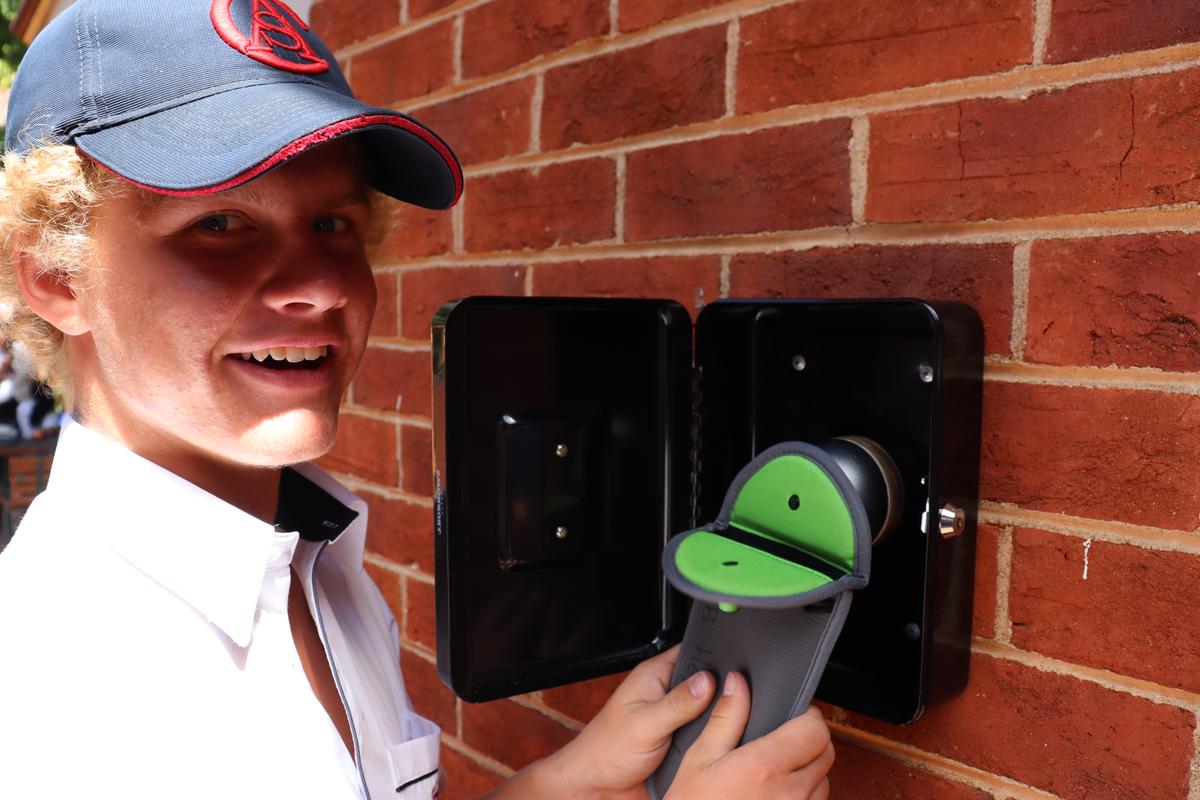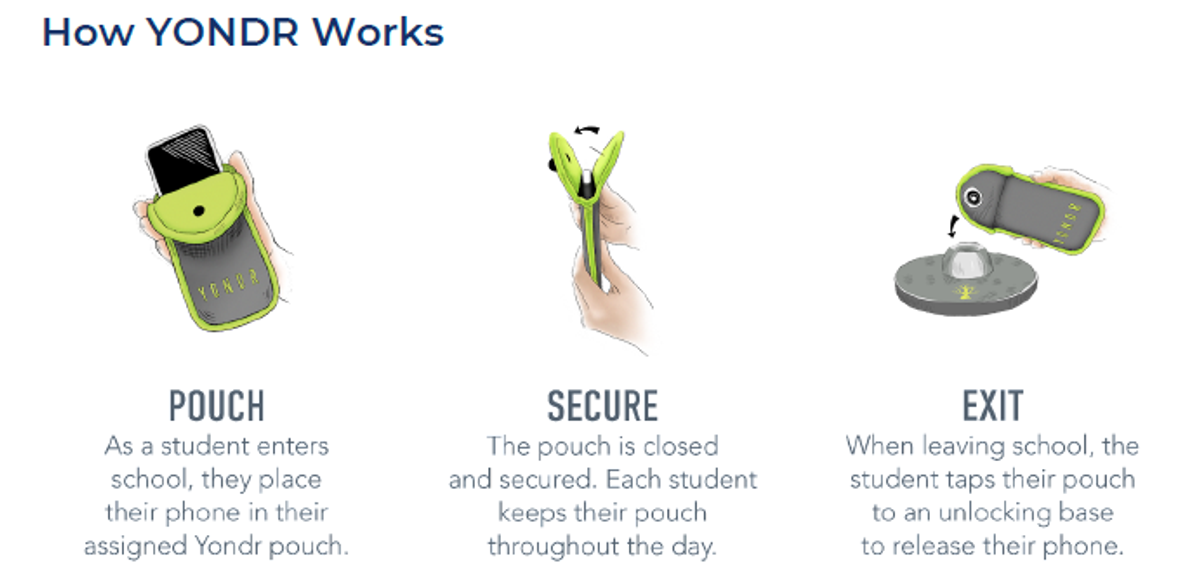Mobile Phones - YONDR

Phone Pouches for Secondary Students
Parents will be aware that we are implementing the use of Yondr Phone Pouches this term in the Secondary School. This follows from growing worldwide concern on the impact of smart phones in school classrooms, relating to mental health and learning. The NSW Government and opposition are both formulating policies that are pointing to a state wide ban of phones in school.
Calrossy parent seminars held last year with Marshall Ballantine-Jones, who talked on the impact of phones on the teen brain, were quite revealing. Whilst Calrossy community discussion on the topic has not been extensive, the introduction of the pouches is a hot topic for many families. I am aware of mixed feelings of our students and parents. (It is important to note that our existing policies already restrict use of mobile phones during the school day.)
I stress that our school is not trying to go back to the ‘old days’ before mobile phones. Of course we want students to be connected and have access to learning resources available. Smart devices are here to stay and will be integral to tour students’ future. Our intent is to maximise learning and the school experience, making the most of their lesson time, learning and relationships. We acknowledge that there are benefits to smart phones and there is a time and important place for them but not in class when learning.
A developing body of neuroscientific study indicates that phones limit concentration and lessen attention spans. The suggestion that kids are good at multitasking is not supported and research is clear that memory, focus and engagement is lower. The addictive nature of social media is also an issue for some students, particularly in the early adolescent years. Sadly, too many students are spending increasing time staring at screens, limiting the face-to-face interaction with peers and friends at school. Feedback from our teachers is that phones are a significant distraction in class, even with older students. Not every child is addicted to social media or misuses their device, though educators across Australia continue to point to greater levels of distraction, as the very apps on the phone are designed to be addictive. Some research links the increasing use of social media amongst teens to lowering levels of wellbeing and increased anxiety.
From where I sit, the benefits of the Yondr pouch include:
- Students maintain possession and responsibility for their own phone during the day
- The standard is consistent for every child across the school
- It prevents the temptation to be constantly checking notifications during lessons, that distracts and lowers memory
- When a child needs assistance or is distressed, they will need to inform an adult, who can assist.
- The filming and use of inappropriate images and videos at school is restricted
- Should a phone be required during the day, teachers will have the capacity to provide them with access.
- Students retain their phones to use in non-school hours, after school in boarding, on public transport and when required
- Parents are in position to talk with their children about phone use at home and out of school hours.
I accept that there are potential disadvantages to the use of Yondr pouches and some parents have asked how they will contact their child during the day, especially in the case of an important message. Another issue mentioned is that of the trust relationship between students and their teachers. The Frequently Asked Questions will address many of these queries.
Whilst we are early in the implementation stage, there is lots of research and anecdotal evidence from other schools across the world that limiting phone use has seen a measurable improvement in wellbeing, learning and school relationships. In schools where the use of the pouches has become part of normal routine, the benefits to everyone have been very positive.
The pouches won’t solve every problem and children over the years have made an industry of being inventive to responding to various restrictions. Student, teacher and parent education remains part of what we must continue to do together. Ultimately, we have taken this step to promote a healthy, happy, and engaged learning environment, supporting our learners to enjoy excellence in a Christian environment and growing to be the very best versions of themselves. As always, feedback from students and parents is welcome and appreciated.
On a lighter note, my wife has asked if I might use a pouch too, as my adult reality is that the distraction of my phone, (a work device in my case), limits focus on family members and tempts me to be less present in relationships, particularly when tired. I also worry about the addictive nature of some social media that wastes my time with little benefit. These are part of the conversations we need to have on the topic as adults as we model responsible use to our children.
For parents who would like to read more on the topic, there are plenty of resources available. Some useful books I have looked at include:
- The Teen Brain – David Gillespie
- The Brain Reset – David Gillespie
- 12 Ways your Phone is Changing Your Brain – Tony Reinkle
- Teens and Social Media – Gary Weiner
- Social Media and Mental Health – Claire Edwards (Ed)
- The Effects of Social Media on Adolescents; Mental Health and Wellbeing – Dr Steph Adam
- Social Sanity in an Insta World – Sarah Eekhoff Zylstra (Ed)
David Smith
Principal
The Yondr Program employs a simple, lockable pouch that stores a mobile phone. Every student will secure their phone in a personally assigned Yondr pouch as they arrive at school. Students will retain their phones throughout the day but may not use them until their pouches are opened at the end of the school day. Students are required to bring their Yondr pouch to and from school each day and are responsible for it at all times. Identifying names will be marked on each pouch. It is the student’s responsibility to always have their Yondr pouch in their bags and to switch their phone off before placing it in the pouch. This will be part of the routine beginning of each day in Mentor group.
We are encouraged by the effects of this system in a range of learning institutions. Yondr surveyed over 900 school partners to measure the effects of creating phone-free educational environments. These schools achieved notable progress in multiple areas:
● 65% of schools saw an improvement in academic performance
● 74% of schools saw an improvement in student behaviour
● 83% of schools saw an improvement in student engagement in the classroom
We believe that the Yondr system will enhance our school learning environment and build on the creative, cognitive, and social skills of our students. At all times our focus is on creating an environment for the most effective learning to take place and mobile phones play a significant part in detracting from our students’ concentration, social competence, and emotional wellbeing.
Stephen Price Julia Boland
Head of Secondary 7-9 Head of Senior Secondary
Frequently Asked Questions
Where are the exit stations located?
On the Brisbane Street Campus the exit stations are;
- two outside the English/HSIE staffroom
- two outside Sims House near Raglan Street
- two at the hall back door (for students exiting Bourke Street and catching buses)
- near 106
- one at reception
- one in student services.
On the William Cowper Campus the exit stations are;
- Reception
- one outside Room 201
- one outside Room 202
- one outside the Resource Room
- two near the Bubblers at the corner of the Hall.
What if I want to reach my child during the school day?
We want our students to be engaged in their learning. Please refrain from contacting your student during the school day unless it is an emergency and if it is please contact the main office at 5776 5100 to reach your child.
What if there is an emergency?
In case of an emergency, student safety is always our first priority. School staff will be able to unlock a Yondr pouch in a matter of seconds for students once they are in a safe and secure location. Students are trained in evacuation and lockdown procedures.
Will my student’s phone be safe?
Students are in possession of their phone - in their Yondr pouch - for the entire school day. We will advise students to store the pouch in their school bag/locker and ensure that each pouch is named. A key aspect of safety is having their phone locked in the pouch and inaccessible for others.
What if the Yondr pouch gets damaged?
The Yondr pouch remains the property of Calrossy Anglican School. If a student damages or tampers with a Yondr pouch, they will be held responsible. A $50 replacement fee for the damaged school property will be charged to the students account and a new pouch will be issued. Students who repeatedly damage the pouch or pin will be dealt with under the School Positive Engagement Framework.
Note: Damage consists of any signs that the physical integrity of the pouch has been compromised, whether intentional or unintentional, as determined by the school.
How can I clean my student’s Yondr pouch?
Yondr pouches can be washed in cold water for a short cycle and dried on a short cycle and/or air dried. Pouches can also be cleaned with a disinfectant cleaner.
What if my son/daughter does not own a phone?
All students will receive a pouch. Students without a phone will notify their mentor teacher that they do not have a phone. This will be signed off by parents in the student diary.
What if my son/daughter needs to depart school early?
Students may unlock their YONDR device at reception when they sign out from school.
When do students lock away their phone and reopen again?
8:20am or upon arrival at school (a bell will ring at 8:20am to notify students). Students may access their device at the conclusion of period 5 in time to depart on buses.


